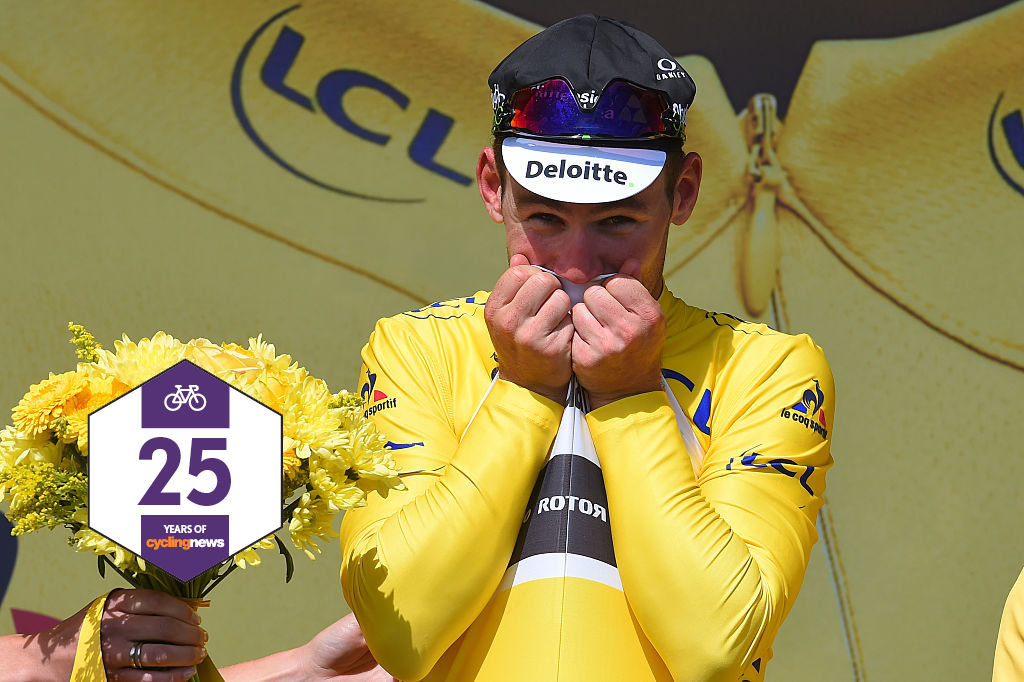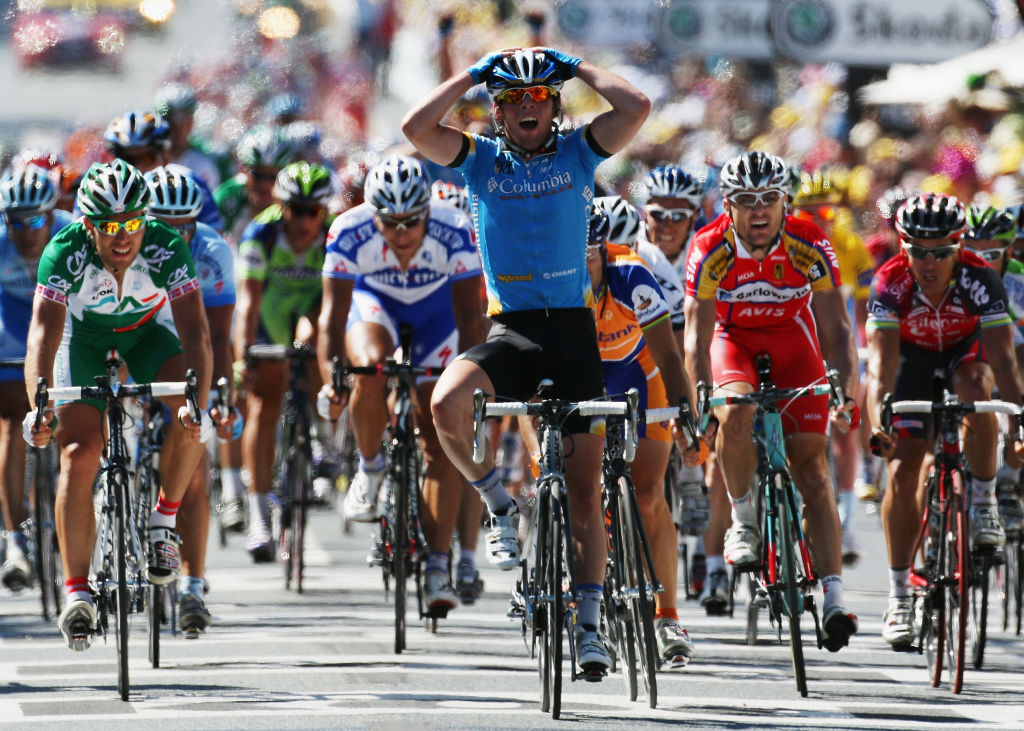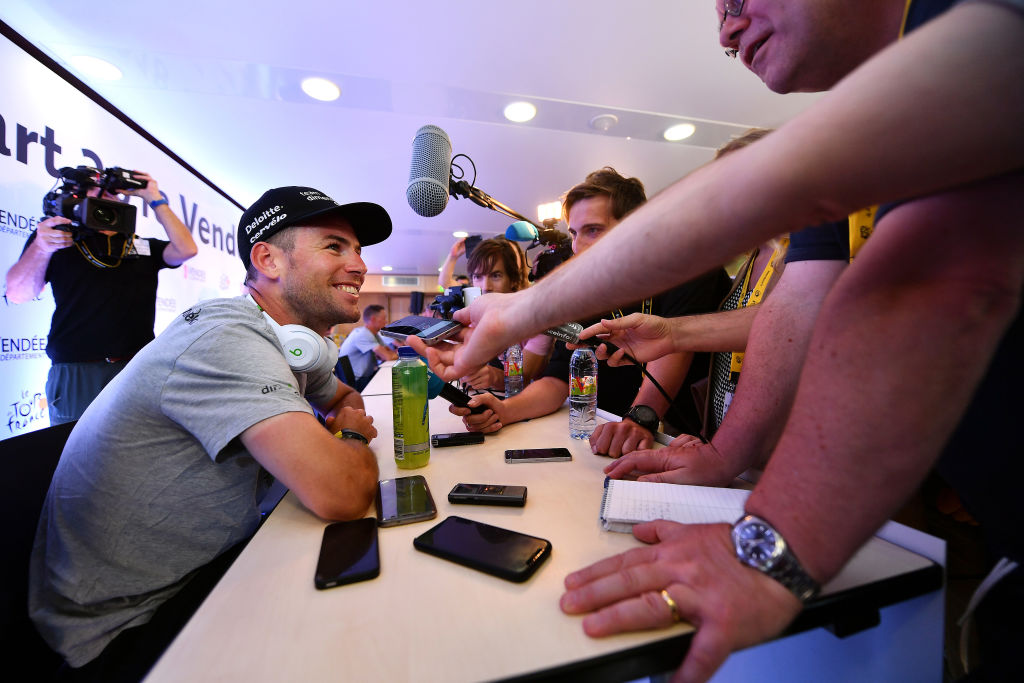Mark Cavendish: From fat banker to sprinting GOAT
A look back at the highs and lows of the Manxman's 15-year career as part of Cyclingnews' 25th anniversary

This year, Cyclingnews celebrates its 25th anniversary, and to mark such an important milestone, the editorial team will be publishing 25 pieces of work that look back at the sport over the last quarter of a century.
Several generations of riders have spanned the 25 years since Cyclingnews was created back in 1995. Mario Cipollini, Erik Zabel and Robbie McEwen all stand out, and their careers were covered in detail over the years as they won sprint after sprint and Cyclingnews developed as fast as internet speeds would allow.
Mark Cavendish's career has run in parallel with the last 15 years of Cyclingnews' development. His and our paths have crossed and intertwined on numerous occasions. There have been memorable moments: exclusive interviews, his emotions captured in moments of unguarded happiness, and plenty of race reports with his name as the winner.
There have been other, less joyful moments, too, of course: when Cavendish was angry with the world in a moment of defeat, or angry specifically with Cyclingnews for something we had written about him. In recent years, he has fought with recurrences of the Epstein-Barr virus, struggled with a period of depression, and was deeply unhappy in his final season at Dimension Data.
The best years may now be over as Cavendish's career nears its end and he decides on his future, but the hundreds of Cavendish stories on Cyclingnews remain a modern-day testimony to his career. They reflect his aggression and competitive spirit but also his huge depth of sensitivity and character that make him who he is.
It has been 15 years of shared cycling emotions.
From fat banker to Tour de France sprinter
Cavendish made his Tour de France debut with T-Mobile in 2007, when the race started in London. That same Grand Départ weekend, Cyclingnews management and guests celebrated purchasing the title from long-time Australian owner Gerard Knapp. For the first time, Cyclingnews was owned by a major media company, and Future Publishing hired a swanky central London hotel terrace overlooking Hyde Park Corner and the prologue time trial course.
Get The Leadout Newsletter
The latest race content, interviews, features, reviews and expert buying guides, direct to your inbox!
Cavendish earned his place in the 2007 Tour de France team thanks to a string of early career victories, including his first of three victories at Scheldeprijs. The team had almost imploded after Jan Ullrich was accused of links to Operación Puerto the winter before, with new manager Bob Stapleton brought in to clean up the team. He recognised Cavendish's talents and ambition, liked the way Cavendish asked for a place in the team via a carefully written letter, and gave him a ride.
The Marianne Vos effect: 2012 Olympics-Worlds and the elevation of women's cycling
Feed the beast: Covering Lance Armstrong for Cyclingnews
Bill's excellent adventure
'No further information available': ONCE, McEwen and the 1995 Mount Buller Cup
Behind the scenes: How Cyclingnews reported on the Genevieve Jeanson story
The 25 most memorable races of the last 25 years
Cavendish lined up alongside fellow Brits David Millar, Bradley Wiggins and a young Geraint Thomas as a nation began to transform from success on the track at the Olympics to success on the road.
He had come through Great Britain's under-23 development academy and recalled the influence of coach Rod Ellingworth, who had guided and cajoled him so much in 2004 and 2005. He lost close to 15kg to emerge as a determined, ambitious and very fast sprinter, who belied the performance numbers of several respected coaches to beat bigger name sprint rivals.
Cavendish expressed his thanks to Ellingworth in a now infamous quote to the Guardian in the days before the London Grand Départ.
"He [Ellingworth] turned me from a fat wanker to a world champion in 15 months. The best thing he did was teach me the ethics of hard work," Cavendish was reported as saying.
Guardian journalist William Fotheringham insists he understood Cavendish said "fat wanker" in his thick Manx accent and the liberal British newspaper was not afraid to print it. Cavendish is adamant he doesn't swear in interviews and claims he said "fat banker" recalling his teenage years working as a cashier for Barclays Bank on the Isle of Man to fund his racing ambitions.
It was the first of many hot quotes and misunderstandings with the media.
Cavendish was only 22 in 2007, and not expected to win at the Tour de France. But he had hopes of testing his sprinting ability in the first road race finish in Canterbury. The day ended as one of Cavendish's most emotional disappointments after a crash with 21km to go meant he lost contact with the peloton.
The Cyclingnews report from the day included a quote from directeur sportif Brian Holm.
"He ran into someone and was half-fighting with the man he ran into on the street. I don't know exactly what happened. Then his handlebars were damaged so we had to move up and change his bike again," Holm said.
"For some reason, the race commissaires made a barrage. Normally with a crash like that, you let the cars go so he can go between the cars, but what the bloody commissaire did today was a very strange situation."
Cavendish eventually finished third from last on the stage, 2:45 behind winner McEwen, and in tears. His rollercoaster of Tour de France emotions had begun with the tears of fear and anticipation, but quickly changed to tears of disappointment.
However, just a year later, the Tour de France marked Cavendish's consecration as a sprint winner and started his long list of 30 Tour victories.
He won four stages in 2008 in the blue Team Colombia colours, and then he won six stages in 2009 in the bright yellow and white of HTC-Colombia, and then another five stages in 2010.

Cavendish was virtually unbeatable. He used his tucked aerodynamic and powerful sprint style to blast away from his rivals after being led out by his loyal teammates and lead-out men Bernhard Eisel and Mark Renshaw. Even the British tabloids started reporting on the Tour de France, adding the 'Cannonball Cavendish' moniker into their headlines.
'Cav' also won sprints early in the season, at the Giro d'Italia and the Tour of Britain, convinced he only ever lost when he or his team messed up. He was right, but Cavendish was box office and brought a lot of readers to Cyclingnews. We followed his every move.
In 2009, he snatched Milan-San Remo victory from Heinrich Haussler in that famous bike-throw sprint, coming from behind to catch his now Bahrain teammate right on the line. In the first of his autobiographies, Cavendish described the sprint as "the best 10 seconds of my life".
He took a further five stages in the 2011 Tour de France, and then won the rainbow jersey at that year's World Championships road race in Copenhagen, Denmark, after the Great Britain team pulled off what was dubbed as 'Project Rainbow' under the management of Ellingworth.
Cavendish's 2012 season as world champion was spent at Team Sky. It seemed like a logical next step, and coincided with Bradley Wiggins' victory at the Tour de France.
Cavendish won three stages but was also happy to play his part in the historic victory. Yet he never quite fitted in with the marginal gains and data-driven ethos of Team Sky. He was one of the stars of British cycling, even without winning a medal at the 2012 London Olympics, but had found his own route to the very top, fuelled by determination and a hunger to succeed. He had no time for those who doubted his training discipline or his temperament.
Cavendish quickly moved to Patrick Lefevere's Omega Pharma-QuickStep team in 2013, going on to describe his three years with the team as the happiest of his career. It is perhaps the reason why he would like to return there in 2021 for a final swansong season.
The years from 2007 to 2015 were the years of peak Cavendish. He won 133 races during the nine intense seasons of racing. At the time, L'Equipe and many other media outlets understandably crowned Cavendish as the greatest sprinter of all time. He still is the sprinting 'GOAT' – the Greatest Of All Time.
Eddy Merckx may have won 34 stages at the Tour de France while on the way to five overall victories, but Cavendish is easily the most successful Tour de France sprinter with 30 wins on his palmarès. André Darrigade is well distanced with 22 victories, while Mario Cipollini, Erik Zabel and Robbie McEwen – his rivals of the modern era – 'only' each won 12 Tour de France stages during their careers.
Capturing the moment at the finish line
In most sports, media access is limited and controlled, and access to the riders is filtered and purified by teams and sponsors in cycling. But the cycling media is fortunate to be able to stand in or just beyond the finish of almost every race. That makes it difficult to see what happens in a sprint, but allows the media to speak to riders just seconds after they cross the line, in the heat of the moment, when adrenaline and emotions are running high.
I've been fortunate enough to witness the raw and intense emotions of victory, and the pain and disappointment of defeat, at the Tour de France. We're then able to explain what we see and hear to Cyclingnews readers and convey riders' reactions.
That access was missing this year due to the COVID-19 restrictions, limiting the media's ability to capture the emotions of the moment. We can only hope it returns in 2021.
During Cavendish's peak years, every victory was major news, and, much to Cavendish's disliking, his defeats and his difficult moments often became bigger news than somebody else's victory. Just ask André Greipel, who Cavendish usurped at HTC as lead sprinter.
Cavendish was often driven by personal pride and hunger to prove his critics wrong and prove himself right, and so his emotions at the finish were usually intense – and certainly more intense than other riders' reactions.
I and others were there to witness his biggest victories. We saw him hug and celebrate with his teammates after Tour de France victories and I was present beyond the finish line at Milan-San Remo when Cavendish burst into tears as he realised that he'd won La Classicissima.
Of course, we were also witness to Cavendish's defeats, and were often the target of his anger. More than once, Cavendish has responded badly to journalists – especially television journalists that were simply looking for a post-race reaction.
In his own autobiography, Cavendish recalls one such incident at the 2008 Tour de France when he ran out of patience with a television journalist chasing a sound bite.
The final question was: "Mark, what have you learned from today?"
Cavendish's quick-thinking, but not very diplomatic, answer was: "That journalists sometimes ask some stupid fucking questions."
I've had similar reactions at Tirreno-Adriatico, the Dubai Tour and elsewhere. Just seconds after the finish, Cavendish's tongue can be as sharp as his sprint. It's never nice when you are just trying to do your job, but in truth it's always worth the risk.
Cavendish is so emotional after a sprint that when he does open up and let out his true feelings, you capture who he really is and what drives him; you capture a sense of the adrenaline-fuelled emotions of sprinting shoulder to shoulder at over 70kph.
Cavendish's unwillingness to compromise on saying what he thinks is congenital. He'll probably never change, and I honestly wouldn't want him to change.
His fits of anger and aggression have turned some of the media and other riders against him. But those who have learned to understand and appreciate Cavendish are able to see beyond his initial anger, knowing a different, far more caring character is there when the red mist of sprinting fades.
Strangely, Cavendish is so very different away from a finish line, in an almost Jekyll and Hyde way. At pre-race press conferences he is quiet and careful with every word. He's polite in front of race organisers and sponsors, and even courteous to local media who know little about professional cycling and sprinting.

He avoids contentious questions by staying silent. Once, while the television cameras were rolling, he opted to slowly spin around on his stool than answer a difficult question. It was his way of counting to 10.
"Written down on paper, it looks arrogant. But if you hear the tone of what I'm saying, it's a lot different. People don't get tone," he told Procycling magazine in early 2019.
Cavendish was speaking after two years in a personal wilderness, sparked by his fight with the Epstein-Barr virus and depression.
His success in 2016 – winning again at the Tour de France and wearing the yellow jersey, and then chasing world titles and Olympic medals on the track and on the road – eventually came at a price.
He thought he had recovered in the spring of 2017 but then crashed out of the Tour de France after his famous clash with Peter Sagan on stage 4 to Vittel. He raced in the final months of 2017 and the first part of 2018, but crashes at Tirreno-Adriatico and Milan-San Remo left him battered and bruised. Dimension Data manager Doug Ryder did not select him for the Tour de France, and his relationship with the team ended anonymously.
His diagnosis could have been better and his comeback could have been more disciplined. But he has paid a high price, only finding solace with his young and loving family, and especially his wife, Peta.
"When I first got it, my wife said to me, 'If somebody said you'd do what you did in 2016 but get sick and lose a whole season, would you have done it?' I was, like, 'You know what? I probably would,'" he told Procycling. "[But] lose two seasons and perhaps my legacy? Probably not."
Trying to overcome Epstein-Barr made Cavendish vulnerable in other ways, and he has since admitted he was diagnosed with depression during his time out of the sport. He avoided interviews for a long time, and still does, but that only meant people were unaware of the true extent of his problems.
"It's the darkest place you can ever go to. It affected my career, my family and the people around me," he revealed to the popular British fitness coach and friend Joe Wicks in the spring.
"I wasn't a nice person to be around, but it made me aware of other people who are having the same trouble. If somebody is suffering, it's a very nasty sickness."
A desire to race on
Cavendish raced with Bahrain McLaren this season, reuniting with new team manager Rod Ellingworth. He didn't win a sprint, and even seemed hesitant to want to feel the expectation and disappointment if he failed.
His protective mask slipped when he emotionally hinted he may retire after riding Gent-Wevelgem, thinking it was his last race of the season due to the COVID-19 pandemic, only to correct himself when he went on to ride Scheldeprijs, the Tour of Flanders and the AG Driedaagse Brugge-De Panne.
"Obviously, I wear my heart on my sleeve, and especially with racing here in Belgium," he said after going in the early break several times as a seemingly final swansong.
"I don't have a desire to stop. I don't want to stop. I love this sport. I give my life to this sport and I'd like to continue riding my bike."
As 2020 ends and teams complete their rosters for 2021, we will soon know if Cavendish's desire to race on will be satisfied, if his desire still really burns strong enough to face another season, or if it is, in fact, the end of an era.

Stephen is one of the most experienced member of the Cyclingnews team, having reported on professional cycling since 1994. He has been Head of News at Cyclingnews since 2022, before which he held the position of European editor since 2012 and previously worked for Reuters, Shift Active Media, and CyclingWeekly, among other publications.